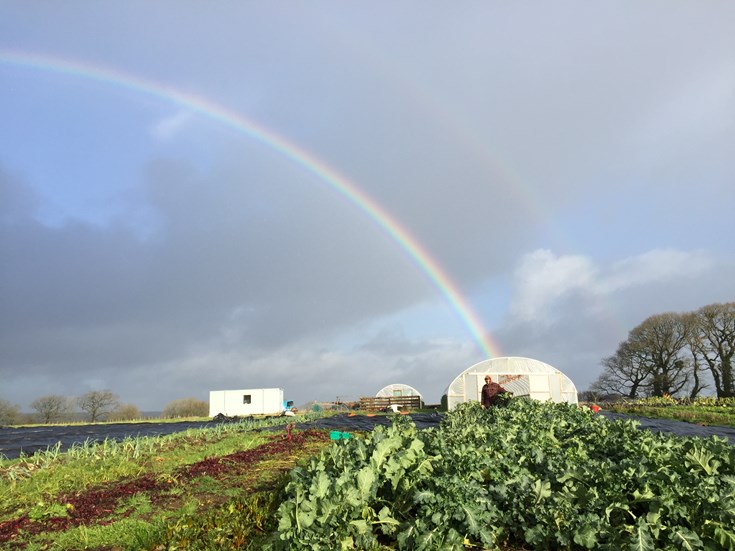
- Soil Association
- Who we are
- What is organic?
- What is organic farming?

What is organic farming?
Organic farming is a whole system approach to sustaining the health of soils, ecosystems, and people.
It relies on ecological processes, biodiversity and cycles adapted to local conditions, rather than the use of harmful artificial inputs. Organic farming combines tradition, innovation, and science. It benefits the shared environment and promotes fair relationships and good quality of life for all involved.
An organic farm system means:
- Caring for animals
- Production in harmony with nature
- Regenerating and sustaining healthy soil
- Producing healthy food
- A fair deal for people and communities
- Building resilience
- Closing the loop
- Knowledge building and exchange
- Trust and integrity
1. Caring for animals
Organic farming has the highest animal welfare standards of any international farming system. Organic animals are truly-free range. They are encouraged to forage, graze and roam, with plenty of space, fresh air, and conditions that allow them to express their natural behaviours.
-
Better for animals
Smaller flocks and herds, and more access to the outdoors mean organic animals don’t have to be routinely treated with antibiotics and wormers. Mutilations like beak-tipping to stop the aggressive side effects of stress are also not needed or allowed.
-
Food produced using fewer antibiotics
Using too many antibiotics in people and animals is making them less effective at treating life-threatening infections. The fewer antibiotics we use, the more effective they will be. 30 percent of all antibiotics used in the UK are used on farm animals. Organic farming standards ban the routine use of antibiotics. This can help minimise antimicrobial resistance and protect the effectiveness of these treatments. Organic farmers prevent disease by practising higher animal welfare standards.

2. Production in harmony with nature
Britain’s wildlife is in decline. And using pesticides in farming is a major reason for this. Studies show that organic farms have on average 30 percent more biodiversity.
-
More biodiversity
Organic farmers take steps to increase biodiversity where possible. This includes things like planting trees, creating beetle banks, sowing wildflower margins, and digging ponds around their fields. They provide homes for bees, birds and butterflies.
-
Less risk of pollution
Organic farming doesn’t allow manufactured fertilisers. This lowers the risk of pollution in rivers, seas and waterways.
3. Regenerating and sustaining healthy soil
Organic farming creates healthy, living soils. It nourishes them with compost, nitrogen-fixing crops and crop rotations. Long term studies show that, on average, soils in organic farms store more carbon and have higher levels of soil microorganisms than in conventional farms.
4. Producing healthy food
The hard work organic farmers put into caring for their crops and animals can pay off in the quality of the food they produce. Research has found significant nutritional differences between organic and non-organic farming.
-
The facts
- A study published in the British Journal of Nutrition in 2014 showed that organic milk and meat contain around 50 percent more beneficial omega-3 fatty acids than non-organic. These nutritional differences also apply to organic dairy like butter, cream, cheese and yoghurt. This is because organic animals eat a more natural, grass-based diet, containing high levels of clover. This is used to fix nitrogen on organic farms, replacing chemical fertiliser.
- Organic meat had slightly lower concentrations of two saturated fats. Organic milk and dairy were found to contain slightly higher concentrations of iron, vitamin E and some carotenoids.
- Organically produced crops (cereals, fruit and vegetables) were found with up to 68 percent more antioxidants than non-organic. Organic fruit and veg contained lower concentrations of pesticides and the toxic heavy metal, cadmium.
- The use of additives and processing aids is heavily restricted in organic. Organic standards ban hydrogenated fats, controversial artificial food colourings, sweeteners and preservatives, like tartrazine and aspartame.
- Fruit and vegetables are not allowed to be washed in chlorine.
5. A fair deal for people and communities
Organic farmers are guided by the organic principle of fairness. They look to make decisions that are fair to all those involved in organic – farmers, workers, processors, distributors, traders and consumers. Organic agriculture should give everyone a good quality of life and help ensure food security and reduce poverty. It aims to supply enough good quality food and other products.
6. Building resilience
Organic farms are more resilient to the effects of climate change. Studies show that on average, soils on organic farms store up to twice as much water. This helps to protect against flooding, as well as droughts.
What’s more, organic farms are more diverse. Using methods like agroforestry to grow other crops means that organic farmers are less dependent on the success of a single crop. This gives them alternatives in the event of crop failures or unpredictable markets.
7. Closing the loop
Organic farmers are encouraged to close the loop on their farms. This means recycling all nutrients and organic matter back to the soil that it grew in. This preserves nutrient and carbon levels, and limits the use of imported resources.
-
No artificial fertilisers
Organic farming lowers the risk of pollution and helps reduce greenhouse gas emissions. It restricts the use of artificial chemical fertilisers and pesticides. These come from burning fossil fuels, and give off harmful greenhouse gases, like nitrous oxide and carbon dioxide.
Instead, organic farmers must build fertile soils naturally. They use compost and manure, which often comes from their own farm or local herds. They also rotate their crops to keep soils healthy.
-
Grazing animals
Grazing animals have an important role to play in the closed loop approach of organic farming. They make use of what’s to hand and limit the need for imported resources:
- They reduce the need for chemical fertilisers. As they graze, animals fertilise the soil by spreading their manure. This feeds nutrients to the plants and organisms in the soil. This improves soil health and removes the need for energy intensive fertilisers.
- Well-managed grazing cattle can also capture carbon. They improve the fertility in soils and increase grassland’s ability to absorb carbon dioxide from the atmosphere.
- They reduce the need to import animal feed. Unlike non-organic systems, organic farmers are not allowed to feed livestock on imported genetically modified (GM) feeds.
Organic cows eat mainly grass. The organic standards require a minimum 60 percent forage, such as grass, legumes and silage, in their diet. The diet of organic animals must mostly come from the same farm or other local organic farms.
8. Knowledge building and exchange
People within the organic movement are eager to help organic deliver on its principles and transform the food and farming system for the better. They do this by participating in research, embracing innovation and sharing best practice across the farming sector.
The Soil Association was one of the founders of the Innovative Farmers programme. It's a network of forward-thinking farmers and growers, researchers and advisors who share knowledge and participate in farmer led research with academics.
9. Trust and integrity
For a product to be labelled as organic, every step in the supply chain must meet organic standards and be certified by a third party, such as Soil Association. From farmers and packers to food processors and shops that sell organic products, they must prove they meet organic standards.
Soil Association Certification demands higher standards across key areas such as animal welfare, protecting human health, and safeguarding the environment. No system of farming has higher levels of animal welfare than farms working to Soil Association organic standards.
Soil Association Certification certify over 70 percent of organic food in the UK. This means that wherever you see the organic symbol, you can be sure of what you're buying.

-
Become a member
Join the community of thousands fighting to transform food and farming - we must act now to protect our health, our natural world, and our climate.
Join us

